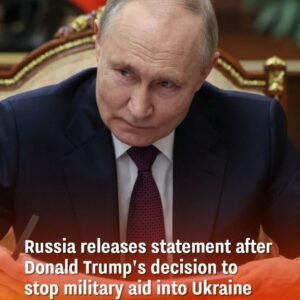Russia Responds to Trump’s Suspension of Military Aid to Ukraine
Russia has officially responded to President Donald Trump’s decision to halt all military aid to Ukraine. The announcement, made on March 3, 2025, follows a tense meeting between Trump and Ukrainian President Volodymyr Zelenskyy, signaling a major shift in U.S. foreign policy. After years of steadfast support—providing over $66.5 billion in aid under the Biden administration—the U.S. withdrawal has sparked an intense reaction from Moscow, NATO allies, and global leaders.
Kremlin spokesperson Dmitry Peskov welcomed the move, calling it “the best contribution to the cause of peace.” He argued that without U.S. military supplies, Ukraine might be forced to engage more earnestly in peace talks. “The U.S. has been the main supplier of this war,” Peskov told Reuters. “If they stop, Kyiv may have no choice but to negotiate.”
A Major Policy Shift
The decision to suspend military aid marks a turning point in the U.S. approach to Ukraine, shifting away from the Biden-era strategy of direct military support. Trump’s administration appears to be pushing for diplomatic and economic solutions rather than continued arms supplies. This shift raises urgent questions about Ukraine’s defense capabilities, the future of NATO’s support, and Russia’s strategic advantage in the region.
International Reactions and Fallout
The Kremlin wasted no time framing the decision as a potential catalyst for peace, while NATO allies voiced deep concerns. European leaders, including UK Prime Minister Keir Starmer, reaffirmed their commitment to Ukraine, with the UK pledging additional £1.6 billion in defense support.
At home, U.S. officials remain divided. Critics warn that halting military aid leaves Ukraine vulnerable and emboldens Russia’s aggression, while supporters argue it’s time for a new strategy. Meanwhile, Ukraine faces an uncertain future, as its survival increasingly hinges on continued support from European allies.
Russia’s Strategic Narrative
Russia sees Trump’s decision as validation of its long-standing claim that Western military aid has prolonged the conflict. Peskov insists that diplomacy—not weapons—will bring peace. Foreign Minister Sergei Lavrov praised Trump’s “common-sense approach”, signaling that Moscow views this as an opportunity to redefine its relations with Washington.
However, critics argue that without military deterrence, Russia could intensify its offensives. The big question now is: Will this suspension push Kyiv toward peace talks—or expose it to further aggression?
The Road Ahead: A New Global Security Landscape
Trump’s decision marks a pivotal moment in U.S. foreign policy, forcing Ukraine, NATO, and Russia to rethink their strategies. If Europe increases its support, Ukraine may still hold the line. If diplomacy fails, Russia may press its advantage.
As the world watches, one thing is certain: this decision will reshape global security for years to come.
